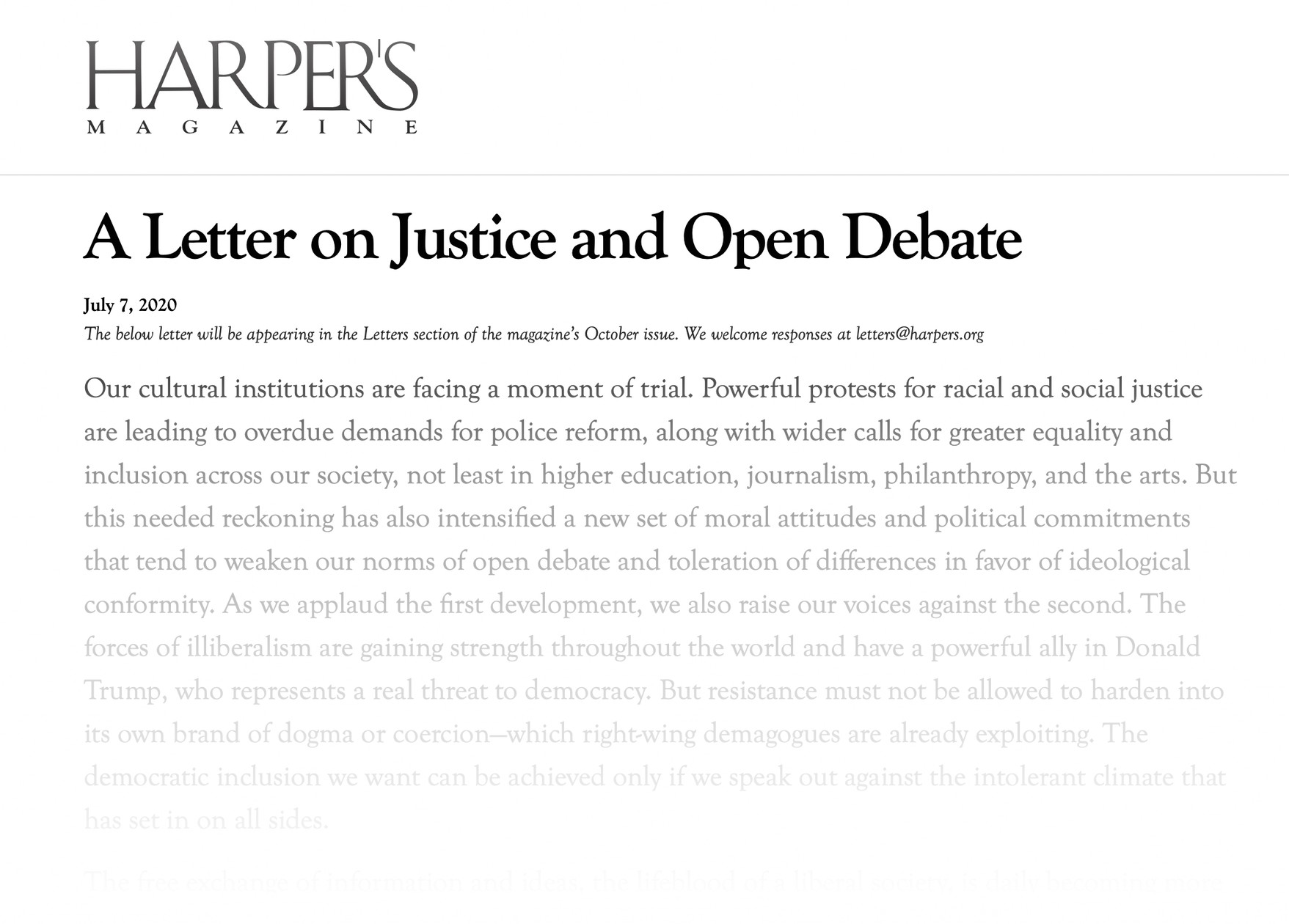
By now I imagine the Harper’s call for “Justice and Open Debate”[i], or at least the backlash to it, has reached everyone. Seeing the usual string of “centrist” neoconservatives on the list was predictable, given the content of the open letter, but it is a letdown to see people like Drucilla Cornell or Matt Karp fall into this trap. Chomsky (the name that a lot of people got hung up on) should’ve hardly been a surprise for anyone, as these have been his views for decades. He remains the only living 19th century libertarian.
Of course, as soon as it was published, multiple signatories at least half-denounced the letter, when they saw in whose company they were and how that made the meaning of their liberal appeal shift into something entirely different. Whoever authored it seems to have pulled the usual bait and switch: Lucia Martinez Valdivia[ii] said that she was only shown the names of POC intellectuals who had signed the letter, while Jennifer Finney Boylan[iii] claims that only Chomsky, Atwood and Steinem were mentioned to her. However, when your open letter is promoted by transphobes, homophobes, racists, war-hawks and (especially given the subject) right-wingers who have been trying for years to get journalists or academics fired for their opinions, and when this open letter is also confronting the excesses (imagined or not) of an anti-racist revolt, then the entire exercise will end up looking like the hypocritical reaction of elites to close ranks and defend themselves from being held accountable for their views[iv].
However, even without seeing the names of the other signatories, the content of the letter should have rung some alarm bells in the heads of the brighter left-leaning people on the list. The text is very vague in its references – phrases like “a new set of moral attitudes and political commitments” (which ones?), or ambiguous invocations of editors, researchers, journalists and institutions’ directors getting fired or shut down for small mistakes or thoughtcrimes (who? for what mistakes?) – and very timid in its interpretations. Being unable to advance a diagnostic in a particular theoretical key, it has to draw on terms such as “dogmatism” to avoid naming a clear adversary (identitarianism, leftism, etc.) or to avoid identifying exact causes. Since it’s written to cover as wide a range of perspectives as possible, the text becomes so evasive and colorless that it precisely signifies next to nothing, and because of this it ends up acquiring a particular meaning (against the intentions of many of its signatories) when linked to the more unsavory voices that promote a particular agenda under the aegis of “free speech”, and when placed in the context of the past month’s events.
Worse still, the only place where we do find a clearer perspective being articulated is in the false equivalency between state “illiberalism”, which forbids opinions by law and under the threat of fines and imprisonment, and the “moralism” of public frustration, which at most manages to gather enough public outrage to lead to a dismissal out of PR considerations. Moreover, in the second case it would be hard to find a career that’s been ended for good because the public couldn’t stand a public figure being too “politically incorrect”. In the US, where “PC Stalinism” supposedly reigns, you have open neo-phrenologists working for prestigious think tanks and alleged pedophiles and rapists in the upper echelons of both parties. James Bennet, the NY Times editor who I presume the letter refers to, had to recently resigned after publishing the Op-ed of a Republican wacko who called for the army to be mobilized to put down the protesters (in passing, these protests numbered up to 15-26 million Americans, depending on who’s counting). This outraged not only the readers of the NYT, but also the staff writers, for obvious reasons. Nonetheless, I’m sure that James Bennet won’t have any difficulty getting work at The Atlantic, or some similar venue, in a few months when the heat blows over, just like all those dismissed on similar grounds before him. On the other hand, the black people killed or incarcerated by the cops, or the protesters mutilated or arrested in the past few weeks won’t be back on their feet so easily, and herein lies a good chunk of the issue: how do you compare the (mostly online) verbal violence enacted by the “intolerant moralists” with the very concrete violence of the American security apparatus?
I sort of understand the impulse behind the more sincere of the signatories, especially given some of the online reactions to the letter (uniform “cancellation” from people who have never heard of most of the names on the list, cheap ironic quips made to gain some crumbs of online clout, and so on). There does indeed seem to be a much more tense atmosphere in progressive/left spaces in the past decade, discussions do seem to easily turn (for lack of a better word) toxic, and many participants to these exchanges are letting their resentments get the better of them, or turn out to simply be opportunists who are trying to make some room for themselves under the spotlight by pushing out some of the old guard. But things usually don’t go beyond this level: a feeling of tension, some outburst of rancor, attempts at entry into the big leagues. In practice just about everyone who had a decent institutional position in mass-media, research, politics or NGOs are still there, maybe moving from one place to another. At most, some public intellectual’s ulcer got a bit worse after they decided to be too online, or some Medium bloggers and podcasters got to make a living off of Patreon after going after “problematic statements”. Real flesh and blood people haven’t had to suffer anything worse than a short time-out from “cancel culture”.
Insofar as the current situation
is concerned, the swerving towards the demands for symbolic concessions of the
American protests has been a step back, after vague but radical slogans, such
as “police abolition” or “defund the police”, became mainstream sometime in
their first or second week. Even in the symbolic realm, nothing short of
blowing up Mt. Rushmore will tie with the historical moment of seeing a police
station burned to the ground by the masses. But things couldn’t have really turned
out differently: American progressivism lacks powerful institutions to direct
the protests towards clear tasks, the American masses have less political power
than the masses of almost any other advanced economy, and the moment it became
unclear how to move forward, the insurrectionary energy of the revolt began to
either dissipate, or to focus on familiar battlegrounds – identitarian
representation, the elimination of openly offensive symbols in public spaces,
sanctioning public figures for their statements etc. Separated from exercising
their power in the economic and political spheres, the crowds moved to media,
where they have some weight as spectators (and commenters), and where,
incidentally, we can find the only thing resembling progressive political structures,
that have consolidated around some media products (magazines, blogs, vlogs and
podcasts) and around networks of left-ish influencers. All this shift to the
symbolic has little to do with the supposed dogmatic rigidity or moralistic
censoriousness of the revolted, and in any case it can’t be fixed with appeals
to calm and liberal value-informed debate, because the millions out in the
streets don’t have a column in a prestigious publication – at best they have a
Twitter account where they can troll and dunk on the liberal intelligentsia
with Gifs.
[i] https://harpers.org/a-letter-on-justice-and-open-debate/?fbclid=IwAR0XSCUPciQkI_DRUyoI_XOiIhIMa0ItPk1fCihKFFUDlqTqt092KGP0kcA
[ii] https://medium.com/@luciamv/trying-failing-trying-again-bb6e6a9f1f83
[iii] https://twitter.com/JennyBoylan/status/1280646004136697863
[iv] To clarify this point, what is usually meant here by “being held accountable” is the audience deciding to no longer read or watch the output of someone whose opinions they find distasteful or, even less than that, to criticize these opinions in particularly virulent terms. How exactly “freedom of expression” turned into “the right to a paid platform for one’s views” and “freedom from harsh criticism” is too long a story to go into it here. Suffice to say that when the only real power most people have lies in consumption, they will try to exercise this power to gain some influence over institutions which are otherwise outside their grasp. The inner-workings of who gets hired for a major American publication have little to do with what the reading public wants to consume, but given enough public outrage, even the most hardened ideological outfit will budge and give the boot to its more repugnant pundits.

